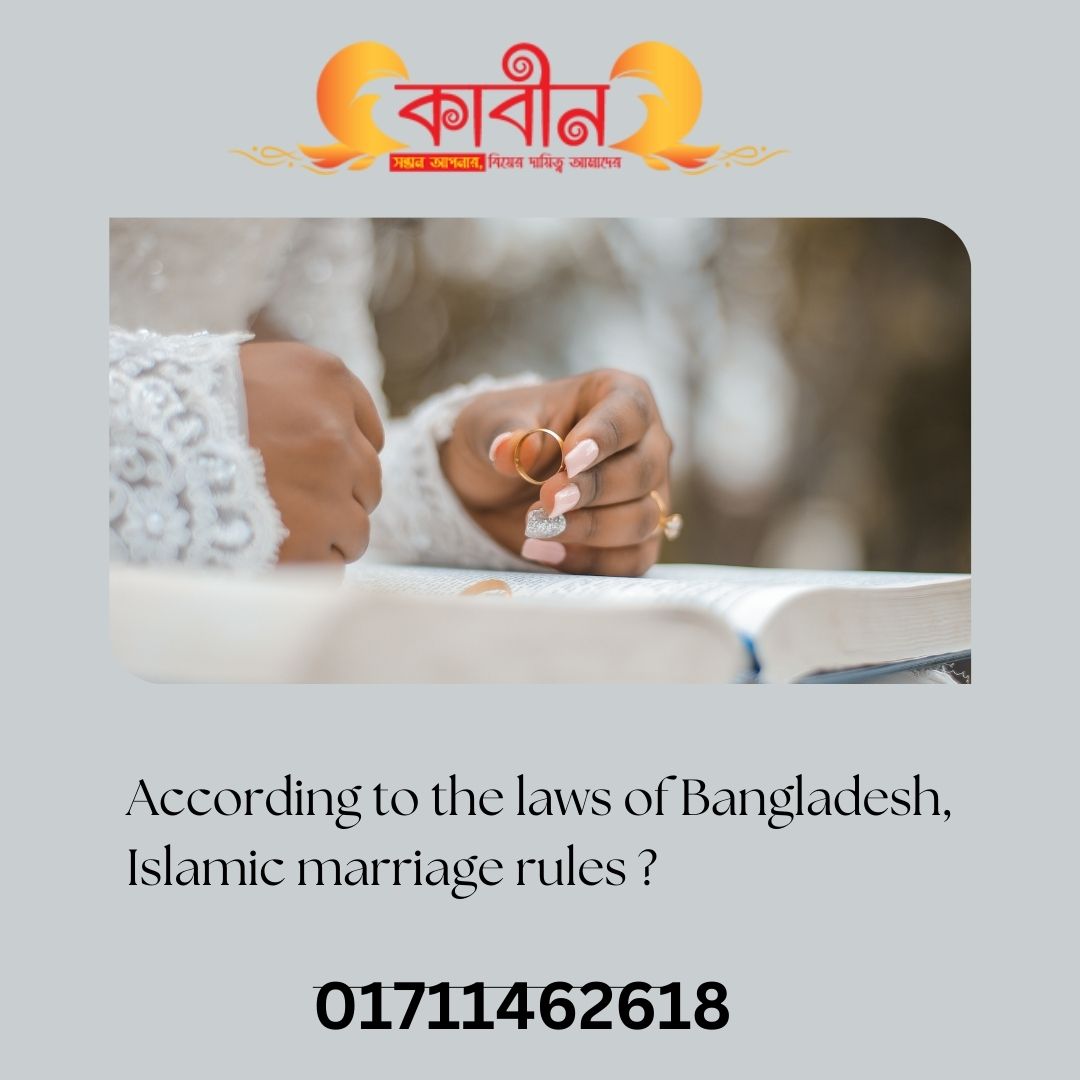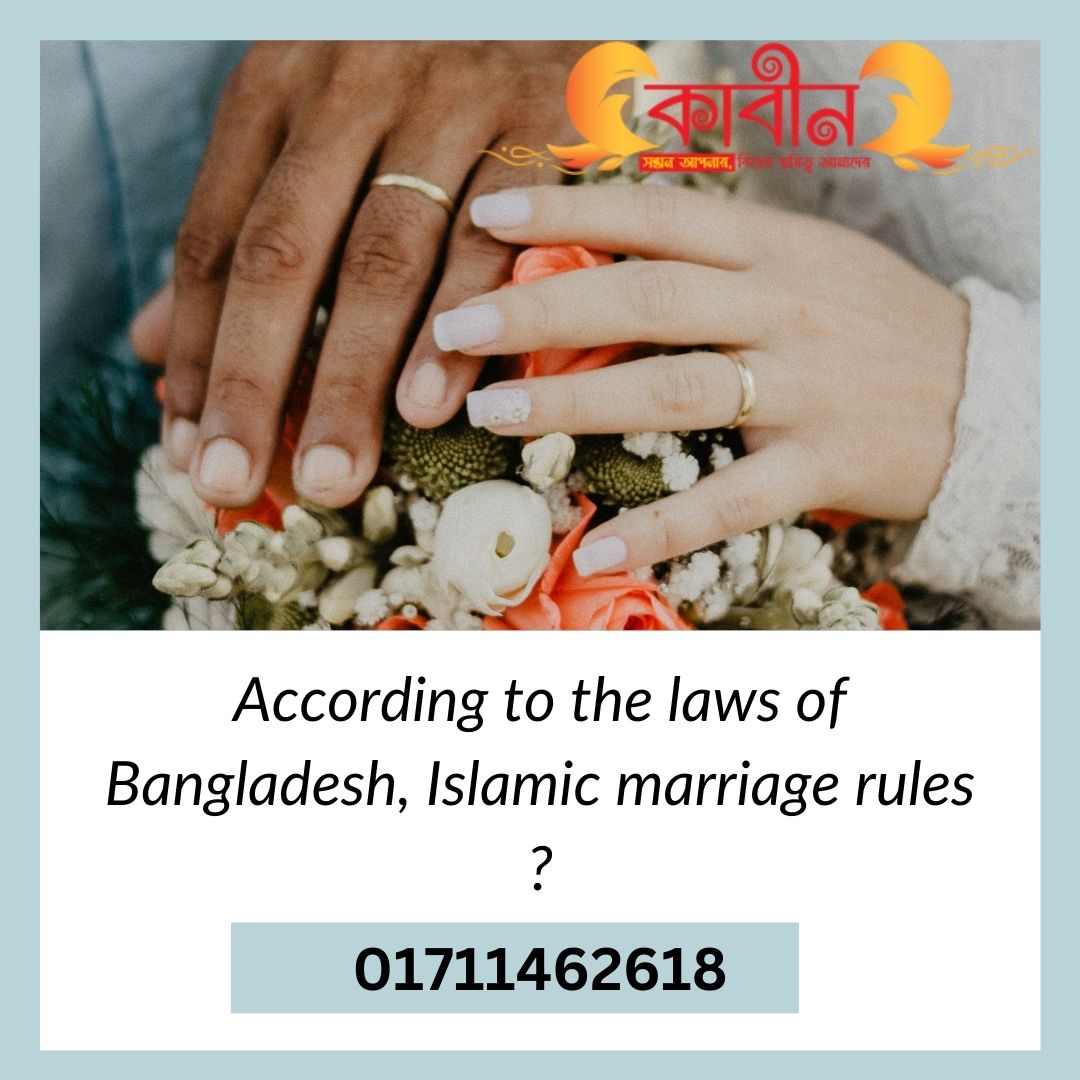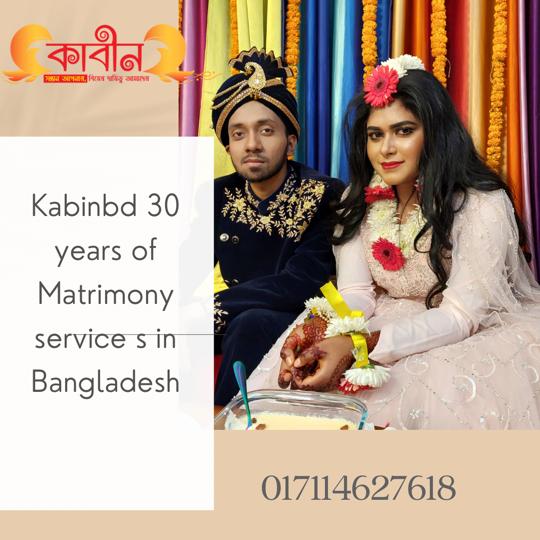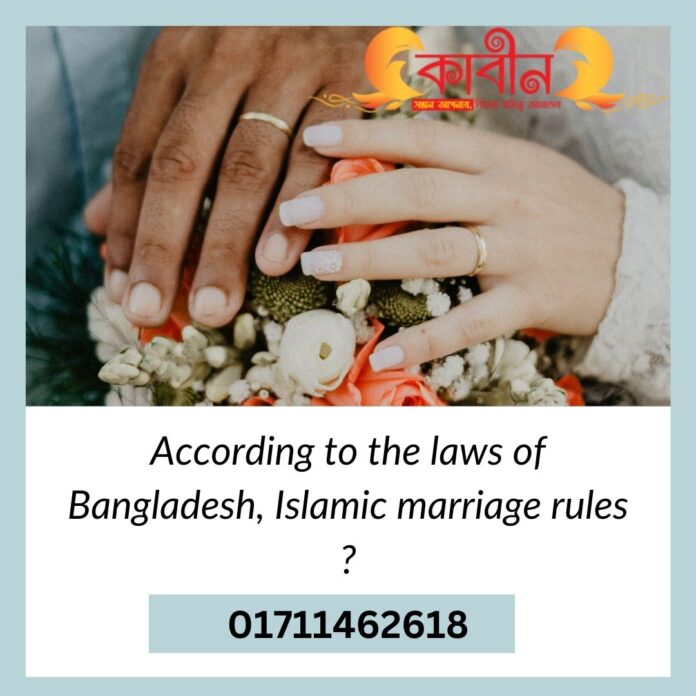According to the laws of Bangladesh, Islamic marriage rules ?

Islamic Marriage Rules According to the Laws of Bangladesh
Islamic marriage rules in Bangladesh are governed by both religious and legal principles. The majority of the population in Bangladesh is Muslim, and as such, Islamic law plays a significant role in regulating marriage. At the same time, Bangladesh has a legal framework that governs various aspects of marriage, including registration, age requirements, and consent. This essay delves into the Islamic marriage rules in Bangladesh, focusing on the legal and religious aspects that shape the institution of marriage in this predominantly Muslim country. Marriage is a sacred bond in Islam, and it is considered to be a lifelong commitment between a man and a woman. It is also a social contract that is governed by Islamic law. In Bangladesh, Islamic marriage rules are based on the Quran and the Hadith, and they are enshrined in the Muslim Marriage and Divorce Act of 1974.
Islamic Marriage Principles in Bangladesh
In Bangladesh, the majority of the population practices Islam, with Sunni Muslims being the predominant sect. Islamic marriage rules in Bangladesh are deeply rooted in the Quran, Hadith (sayings and actions of Prophet Muhammad), and Islamic jurisprudence. Marriage is regarded as a sacred contract, and there are several fundamental principles that govern it:
- Consent: According to Islamic law, both parties must give their free and voluntary consent to the marriage. Forced marriages are strictly prohibited, and consent is considered a cornerstone of a valid Islamic marriage.
- Mahr (Dower): The groom is required to offer a gift or dower to the bride as part of the marriage contract. This gift is the woman’s exclusive property and acts as a form of financial security for her.
- Witnesses: Islamic law requires the presence of witnesses during the marriage ceremony. In Bangladesh, it is customary to have two male witnesses or one male and two female witnesses to attest to the marriage.
- Guardianship: The bride’s guardian (usually her father) plays a crucial role in facilitating the marriage. While the consent of the bride is paramount, her guardian’s approval is often sought.
- Wali (Guardian): A wali is a legally appointed guardian who ensures that the bride’s rights and interests are protected during the marriage process. In the absence of a wali, the marriage is considered invalid in Islam.
- Announcement: The marriage is usually announced, and it is customary to celebrate this significant life event with friends and family.
- Rights and Responsibilities: Islamic law outlines the rights and responsibilities of both spouses. It emphasizes mutual respect, support, and the equitable treatment of each partner.
These principles form the foundation of Islamic marriage in Bangladesh and are followed by the majority of Muslims in the country. While the religious aspects are vital, Bangladesh also has a legal framework that governs marriage to ensure the rights and protection of its citizens.
Essential Elements of an Islamic Marriage
There are six essential elements of an Islamic marriage:
- Offer and acceptance: The marriage contract must be made freely and without coercion. The groom must make an offer of marriage to the bride, and she must accept it.
- Witnesses: There must be at least two Muslim witnesses to the marriage contract.
- Mahr: The groom must give the bride a mahr, which is a wedding gift. The mahr can be anything of value, but it is typically money or jewelry.
- Guardian: The bride’s guardian must give his consent to the marriage.
- Publicity: The marriage must be made public. This can be done by announcing it to the community or by having a wedding ceremony.
- Consummation: The marriage is not consummated until the husband and wife have sexual intercourse.
Who Can Get Married Under Islamic Law?
Under Islamic law, only Muslims can get married to each other. A Muslim man is allowed to marry a Christian or Jewish woman, but a Muslim woman is not allowed to marry a non-Muslim man.
Prohibited Marriages
There are a number of marriages that are prohibited under Islamic law. These include:
- Marriages between close relatives, such as parents and children, siblings, and aunts and uncles.
- Marriages between foster relatives.
- Marriages between people who are already married.
- Marriages between people of different religions.
Legal Marriage Rules in Bangladesh
Bangladesh, like many countries, has a legal framework that supplements Islamic marriage rules. The legal framework for marriage in Bangladesh is primarily governed by the Muslim Family Laws Ordinance 1961. This ordinance addresses several aspects of marriage, including:
- Registration: The Muslim Family Laws Ordinance 1961 mandates the registration of all marriages. This registration is done through the local Union Parishad (the lowest administrative unit in rural areas) or City Corporation (in urban areas).
- Age Requirements: The legal age for marriage in Bangladesh is 18 for females and 21 for males. This age requirement is in place to prevent child marriages and ensure that both parties are mature enough to make informed decisions.
- Polygamy: The ordinance limits a man’s ability to have multiple wives. A man must obtain permission from a local arbitration council to marry a second wife, and this permission is typically granted only under specific circumstances.
- Dower: The ordinance requires that the dower, which is a fundamental component of Islamic marriages, is specified in the marriage contract. This ensures transparency and fairness in the financial aspects of the marriage.
- Notice of Marriage: A notice of intention to marry must be given to the Marriage Registrar, allowing for the investigation of any impediments to the marriage.
- Divorce: The ordinance outlines rules for divorce, including provisions for maintenance, custody of children, and the grounds for divorce.
- Monogamy: The ordinance promotes monogamy, with certain exceptions as mentioned earlier.

According to the laws of Bangladesh, Islamic marriage rules ?
The legal framework provides a set of rules and regulations designed to ensure that Islamic marriages in Bangladesh comply with certain legal standards. While the principles of Islamic marriage, as discussed earlier, guide the religious aspects of marriage, the legal framework ensures that marriages are recognized and recorded by the state, and the rights of both parties are protected.
Challenges and Controversies
Despite the presence of both Islamic and legal frameworks governing marriage in Bangladesh, several challenges and controversies persist. One of the most significant issues is child marriage. While the legal age for marriage is set at 18 for females, child marriage remains a pressing concern in some parts of the country. Poverty, cultural traditions, and a lack of enforcement have contributed to the persistence of child marriage.
Furthermore, there is often a gap between the principles of Islamic marriage and their practice. In some cases, cultural practices and customs may supersede Islamic principles, leading to forced marriages or situations where consent is not genuinely voluntary. This divergence between religious ideals and real-world practices can lead to issues such as unequal treatment of spouses and violations of women’s rights.
Additionally, disputes over dowry (mahr) are not uncommon in Bangladesh. Although the dowry is meant to provide financial security to the bride, disputes and conflicts can arise when expectations regarding the dowry are not met, leading to both legal and social issues.
Muslim Marriage and Divorce Act of 1974
The Muslim Marriage and Divorce Act of 1974 is the main law that governs Islamic marriage in Bangladesh. The Act sets out the essential elements of an Islamic marriage, the prohibited marriages, and the procedures for divorce.
Registration of Marriage
The Act requires that all Muslim marriages be registered with the government. This can be done at the local union parishad office.
Polygamy
Polygamy is allowed under Islamic law, but it is subject to strict conditions. A man can only have four wives at a time, and he must treat all of his wives equally.
Divorce
Divorce is allowed under Islamic law, but it is discouraged. There are a number of different ways to get a divorce, but the most common way is through a talaq, which is a repudiation of the marriage by the husband.
Rights of Women in Islamic Marriage
Women have a number of rights in Islamic marriage. For example, they have the right to choose their own husband, the right to a mahr, the right to be treated with respect, and the right to divorce.
Additional Information
Here is some additional information on Islamic marriage rules according to the laws of Bangladesh:
- Minimum age of marriage: The minimum age of marriage for both boys and girls is 18 years old. However, a court can grant permission for a minor to get married if there are special circumstances.
- Consent: Both the bride and groom must freely consent to the marriage. Forced marriage is prohibited under Islamic law.
- Guardianship: The bride’s guardian must give his consent to the marriage. The guardian is typically the bride’s father, but it can also be another male relative, such as her brother or uncle.
- Mahr: The mahr is a wedding gift that the groom gives to the bride. The mahr can be anything of value, but it is typically money or jewelry. The mahr is a deferred debt, which means that the bride is not entitled
Conclusion
Islamic marriage rules in Bangladesh are deeply rooted in religious principles, with Islamic law emphasizing the importance of consent, financial security (through the dower), and mutual rights and responsibilities. These religious principles are supplemented by a legal framework in Bangladesh, which aims to protect the rights of individuals, regulate marriage, and ensure that the marriage is recognized by the state.
However, the challenges faced in the practice of these rules and regulations cannot be ignored. Issues such as child marriage, cultural practices, and disputes over dowry continue to pose significant challenges. It is essential for the government, civil society, and religious leaders to work together to bridge the gap between religious ideals and real-world practices, ensuring that the rights and well-being of all individuals, especially women, are protected within the framework of Islamic marriage in Bangladesh.
Islamic marriage rules are based on the Quran and the Hadith, and they are enshrined in the Muslim Marriage and Divorce Act of 1974. The essential elements of an Islamic marriage are offer and acceptance, witnesses, mahr, guardian, publicity, and consummation. Only Muslims can get married to each other, and there are a number of marriages that are prohibited under Islamic law. The Muslim Marriage and Divorce Act of 1974 requires that all Muslim marriages be registered with the government. Polygamy is allowed under Islamic law, but it is subject to strict conditions. Divorce is allowed under Islamic law, but it is discouraged. Women have a number of rights in Islamic marriage, such as the right to choose their own husband, the right to a mahr, the right to be treated with respect, and the right to divorce.
“বিয়ে সংক্রান্ত যেকোনো তথ্য ,সেবা এবং পরামর্শ পেতে যোগাযোগ করুন কাবীন বিডির সাথে । ” কল করুন:01711462618










